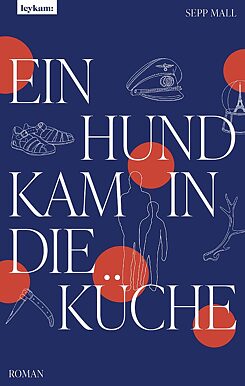Cherrypicker
A Wartime Childhood
In his new novel, Sepp Mall tells the story of a South Tyrolean family during the Second World War from the both innocent and harrowing perspective of a child.
By Holger Moos
Having multiple options sounds like a good thing. In 1939, Fascist Italy and Nazi Germany negotiated a so-called option agreement that gave the German and Ladin-speaking population of Italy – most of which are now in South Tyrol – a choice. They could either opt for the German Reich with subsequent emigration or they could remain in Italy. This option had little to do with personal self-determination, though. The Italianisation campaign and the Nazi propaganda for resettlement to the German Reich made the decision fraught with conflict, including violent attacks and acts of terror by “optants” on “remainers.” By 1943, around 75,000 people had emigrated to Hitler’s Germany, many of whom returned to their old homeland after the end of the war.
This is the historical background to Sepp Mall’s novel Ein Hund kam in die Küche, in which a family emigrates to the German Reich in 1942. The father, influenced by Nazi propaganda, makes the decision and the resigned mother submits to it, while their two sons Ludi and Hanno have no idea what lies ahead. The story is told from the perspective of eleven-year-old Ludi. His younger brother Hanno is physically and mentally disabled.
Totally German
In Innsbruck, the first stop on their journey, the family is examined by doctors who decide that Hanno must stay in a local sanatorium and nursing home. Today, we know what that would mean. Ludi is shocked that the rest of the family is continuing the journey without his beloved brother, but he believes that Hanno will only have to stay there for a short time.They travel on to the Reich district of Oberdonau, now Upper Austria, and shortly afterwards their father is drafted into the army. In his new surroundings, Ludi quickly realises that there is a difference between the Germans of the Reich and immigrant ethnic Germans like them. A boy asks him in Austrian dialect whether he and his family are deitsch, “German... Not Italian?” Ludi knows what to answer and imitates the boy’s language, “No, not Italians... totally deitsch,” he emphasises. Now nothing stands in the way of friendship with this boy named Siegfried.
Meanwhile, Hanno is transferred to the Bavarian sanatorium and nursing home in Kaufbeuren-Irsee, from where the family soon receives official notification of their son’s death. Diagnosis: pneumonia. His deceased brother then becomes Ludi’s imaginary companion; not only appearing to him in his dreams, but even when he is awake.
No words for saying goodbye
Telling a story from the perspective of a child is not a new narrative contrivance, but neither it is an easy literary endeavour. Sepp Mall completely succeeds at it. The simplicity of the language and the lack of knowledge about global events resonate with innocence. The childlike choice of words initially sounds disarming. In the beginning, for example, in Ludi’s language the emigration becomes simply a Wanderung or “migration,” making it sound like a short trip and not so final. Fleeing Sudeten Germans become “Swedish Germans.” When his father “stands in the field,” Ludi thinks of a sugar beet field. The word euthanasia is not mentioned once in the entire novel, but all that is unspoken makes the contempt for humanity seem even more shocking.Speechlessness is also an important theme. This becomes clear right at the beginning of the novel: “In our family, there were no words for saying goodbye. My father had none and neither did my mother.” Sepp Mall convincingly tells of this speechlessness, of what is left unsaid, of what the adults don’t want to talk about. Under these circumstances, Ludi’s only option is to have a sad dialogue with his deceased brother, who now finds it much easier to speak. When the war ends, Hanno disappears from Ludi’s imagination, as if his soul, and perhaps Ludi’s too, has now come to rest.
As in the endless song A Dog Came in the Kitchen the story finally ends for Ludi and his mother back where it began: one morning, with the help of a smuggler they “wander” across the green border back to South Tyrol. But the familiar surroundings have changed, even if the “inscriptions in favour of the Duce and his party” still shine through. When the father, who returns home severely traumatised by war and imprisonment, establishes a connection between his guilt and Hanno’s death, Ludi also reaches the limits of what can be said: “I wouldn’t have said all that to Hanno, I couldn’t have said it.”
Graz: Leykam, 2023. 192 p.
ISBN: 978-3-7011-8286-2
You can find this title in our eLibrary Onleihe.

